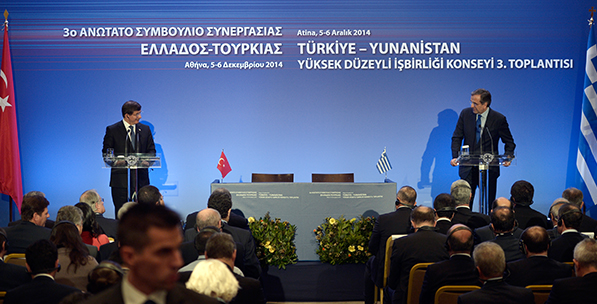My Big Fat Greek Wedding" was one of the most successful comedy films about the life of immigrants in the U.S. The romantic comedy was about a Greek family, the Portokaloses, and the marriage of the family's daughter, Toula, with an American and the opposition of the father, a Greek nationalist, to the marriage. What makes the movie particularly funny was the sarcasm about the extreme Greek patriotism and cultural nationalism of the father and some references to Turkey in the discourse of Greek nationalism by different family members. It was interesting to watch how the anti-Turkish Greek nationalism, which had been once the predominant discourse and found a counterpart on the other side, became a source of irony and sarcasm. Turkish viewers who had not been exposed to Greek culture before also found it hilarious to watch how culturally similar Greek families and their mode of behavior are to Turkish ones.
The movie was released in a period when both nations were having a "crisis fatigue" in bilateral relations and when cultural exchanges and social interactions between the two countries were rising rapidly. In previous decades, most of the attempts to mend ties between the two neighbors remained limited to personal diplomacy such as the personal diplomacy between Turgut Özal and Andreas Papandreou in the 1980s and later between Ismail Cem and Yorgo Papandreou in the 1990s and symbolic gestures, such as the earthquake diplomacy in 1999 and the attempt of the two countries to jointly host the UEFA European Championship. However, none of these diplomatic encounters resulted in serious systematic and sustainable improvements in relations.
An important turning point in relations took place in 2010 when the two countries formed the High Cooperation Council for the first time in their history to be able to bring cabinet ministers together in joint meetings. There have since been regular summits and more frequent meetings between policymakers from both sides. The High Cooperation Council had its third meeting in Athens last Friday at a critical juncture of relations. In addition to the main goals of improving economic and political relations, there were two very important items on the meeting's agenda. It was interesting to see some Greek newspapers welcoming Prime Minister Ahmet Davutoğlu and writing about the necessity for both countries to resolve their problems and launch a new beginning. The "crisis fatigue" in bilateral relations was very obvious among ordinary Greeks who considered improving economic ties between Turkey and Greece as a significant opportunity to deal with the crisis.
Today, a significant portion of the public on both sides agrees that boosting trade, tourism and transactions can generate a potential win-win situation. It was obvious in Greece that the recent developments and summits between the two countries also increased the interest of Greek society in Turkish politics. Especially after several unstable governments and a huge economic crisis, Turkey, with a stable government, economic growth and smooth transition, attracts the attention of Greek society and polities.
Davutoğlu, along with nine ministers met their counterparts and held a joint session of the Cabinet during the meetings. In his conversation with journalists on his way back, Davutoğlu was also very positive and expressed cautious optimism regarding the future of bilateral relations. In regard to two significant issues, both sides expressed good will and intention to cooperate and coordinate their policies. First of all, both the Greek and Turkish governments emphasized their willingness to restart the stalled peace process on Cyprus, which can be an important ground to re-launch a process about the conflict. Secondly, more conciliatory language was developed in regards to the energy resources around the island. Although both of the outcomes of the meetings do not guarantee a final agreement on the issues, there was a willingness to negotiate and resolve disputes. In fact, as stated by Davutoğlu, t







